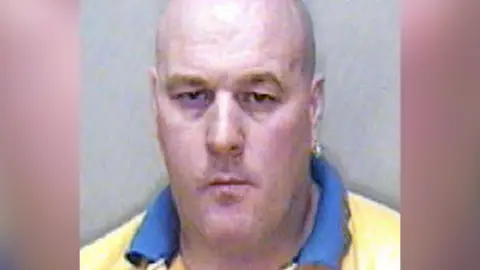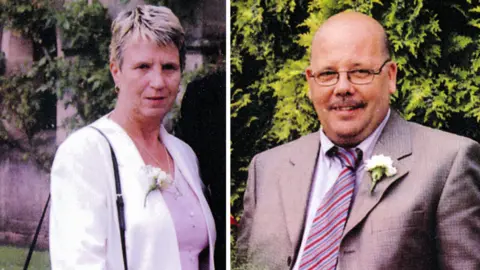Jailed Nottingham crime boss Colin Gunn to challenge security status
 Submitted
SubmittedNotorious Nottingham crime boss Colin Gunn is bringing a High Court challenge over whether he poses a high risk of escape from prison.
Gunn was jailed for 35 years in 2006 for conspiracy to murder John and Joan Stirland as "revenge" on their son.
He now claims a Ministry of Justice (MoJ) decision last February to not downgrade his escape risk classification was unfair and unlawful.
The MoJ said its decision was "entirely rational".
Gunn was jailed following the killings of Mr and Mrs Stirland in Trusthorpe, Lincolnshire.
Currently an inmate at high-security HMP Long Lartin in Evesham, Worcestershire, Gunn alleges the MoJ's decision means he experiences a "significantly more intrusive and restrictive regime in the prison".
He also claims it prevents him moving to a lower security category and reduces his prospect of release on licence at the end of his minimum term in 2040.
 Lincolnshire Police
Lincolnshire PoliceAt a hearing on Wednesday, Gunn's lawyers argued the MoJ should reconsider its decision following an oral hearing, in which he can make his case over whether he could be of "standard" risk.
Gunn was last classified as being of "exceptional" risk in March 2013, due to allegations he tried to corrupt a member of staff as part of an escape plan, before being downgraded to "high risk" in September that year, a judge in London was told.
Leonie Hirst, representing Gunn, said in written arguments that the MoJ had placed "undue and irrational reliance on factors which were irrelevant and which were not supported or were overtly contradicted by the evidence".
The barrister said some "intelligence concerns" over "illicit mobile phone use" were "speculative" or "entirely innocuous" and were not relevant.
She said an assessment that Gunn was "the head of an organised crime group with associates able to assist in an escape attempt" was "unsupported by any evidence".
Ms Hirst said Gunn was a "trusted inmate" who had shown "good behaviour" in recent years, having held prison jobs and mentoring roles.
She said his status meant he frequently moved cells, was escorted everywhere while off his prison wing, had supervised visits and was "woken every hour at night by staff observing him with a torch shone through the wicket in his cell door".
Crime empire
David Manknell, for the MoJ, said in written arguments that Gunn's claim should be dismissed, adding that prison policy "does not provide for oral hearings for escape risk classification reviews".
He said Gunn was previously classified as having an "exceptional" escape risk due to "past intelligence of escape attempts... ties to serious organised crime groups" and offending "which evidenced a high level of determination to enact severe retribution".
Mr Manknell said the classification decision had taken into account Gunn's "access to finances, resources and/or associates that could assist an escape attempt", his "position in an organised crime group", the nature of his offending, the length of time he had left to serve, and "his determination to communicate with outside associates in a way that was unmonitored, as evidenced by the illicit telephony".
Gunn, once said to have run the Bestwood Estate in Nottingham with his brother, David Gunn, built up a multimillion-pound empire based on drugs, extortion and violent crime.
He was also handed a nine-year sentence in 2007 for bribery of two police officers and conspiracy to corrupt.
A ruling is expected at a later date.

Follow BBC East Midlands on Facebook, on X, or on Instagram. Send your story ideas to [email protected] or via WhatsApp on 0808 100 2210.
